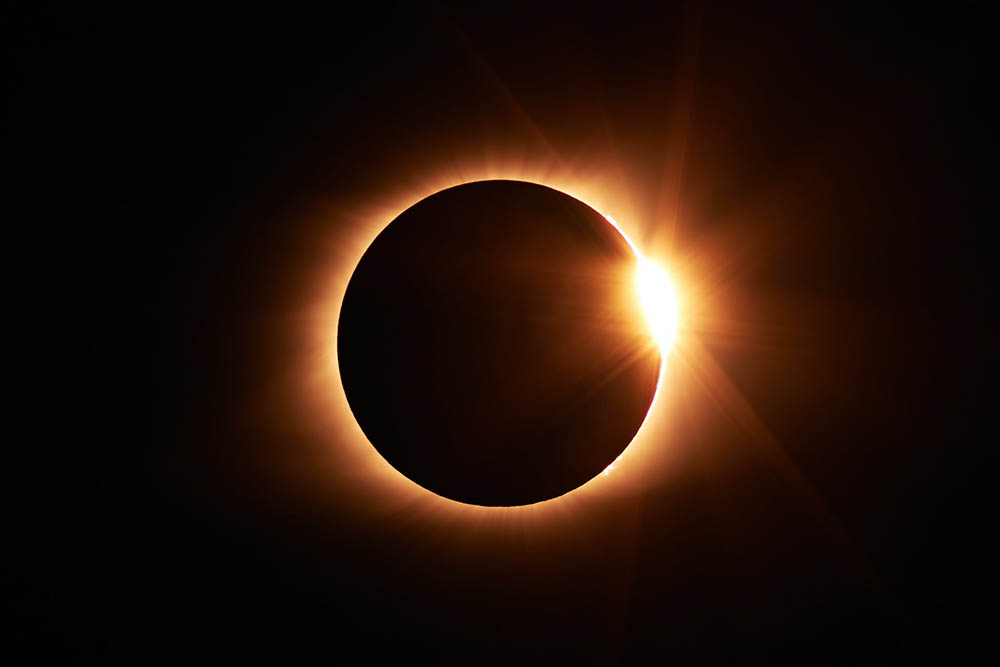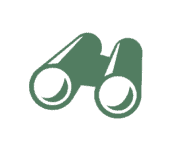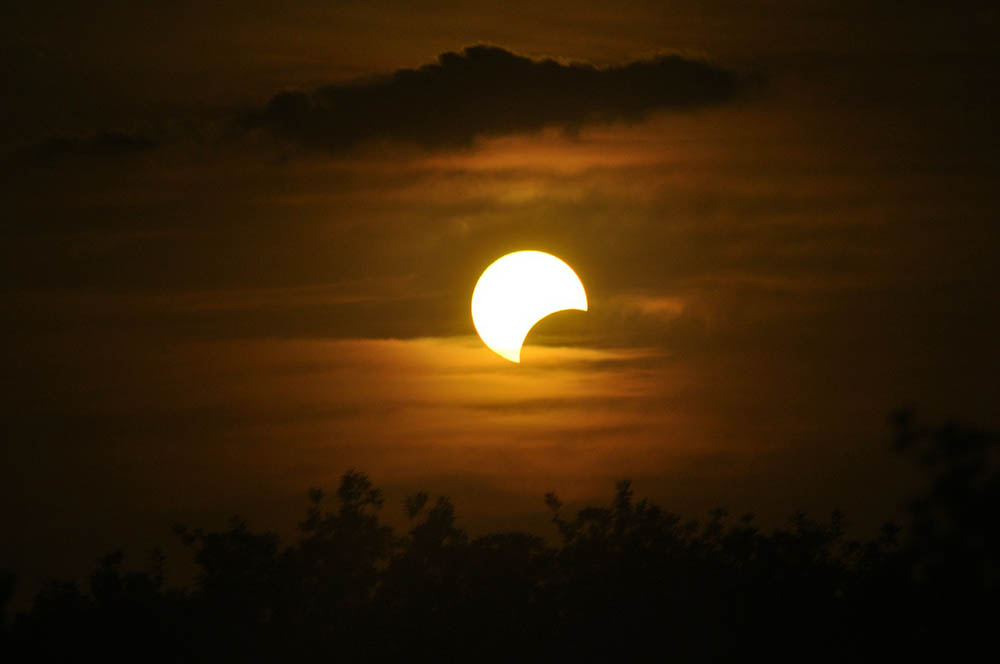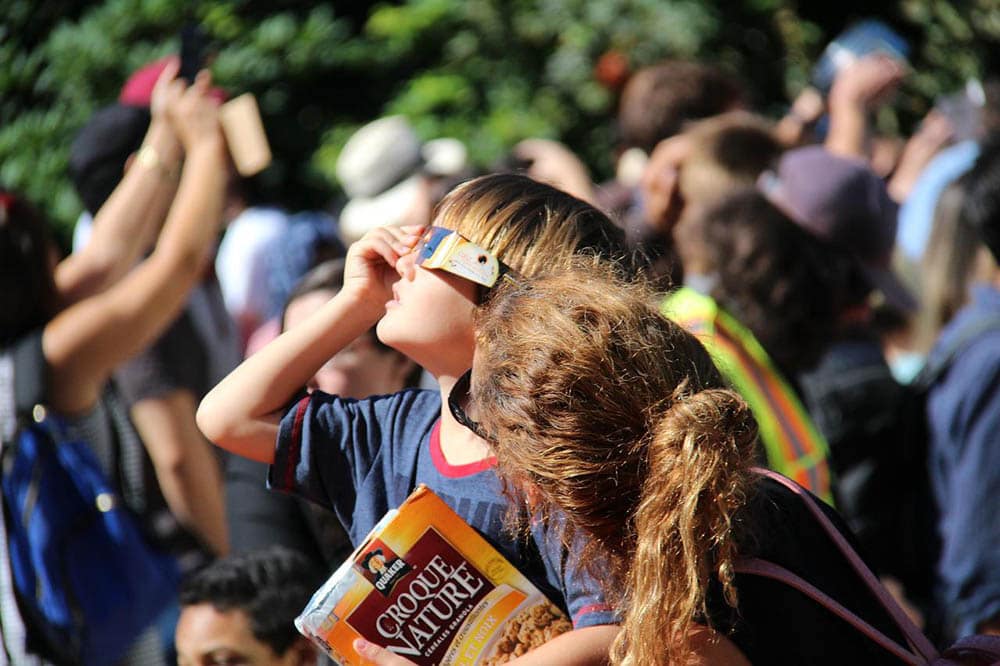What Happens If You Look at a Solar Eclipse Directly? How to Do It Safely
Last Updated on

There’s no denying that solar eclipses are awesome things to experience. However, while it’s incredibly tempting to look up and see what all the fuss is about, it’s not safe to look directly at a partial or annular solar eclipse.
It can lead to either temporary or permanent eye damage. But what exactly happens, and how can you view a solar eclipse safely? We break it all down for you here, so you can prepare for the next solar eclipse and safely enjoy the experience!

What Happens If You Look Directly at a Solar Eclipse?
Even if Earth’s shadow is covering part of the sun, it’s not safe to look directly at a solar eclipse. The sun’s rays are so bright, even when you can only see part of the rays, it can cause serious eye damage.
Staring directly at a solar eclipse can cause retinal burns, which can occur without any pain. So, if you think that you can look and just stop as soon as you notice discomfort, that’s not how it works and it’s not a good idea.
In fact, you won’t even know if you have damage right away. It can take a few hours or days to realize anything’s wrong, and then the damage might be temporary or permanent.
Signs of retinal damage include loss of central vision, distorted vision, and altered color vision. Whatever you do, don’t look directly at a partial or annular solar eclipse.

How to Safely Look at a Solar Eclipse
Just because you can’t look directly at a solar eclipse doesn’t mean it’s impossible to view one — you simply need to take the right precautions.
If you want to look directly at a partial solar eclipse, you need to wear protective eclipse glasses. These block out the harmful rays of the sun and block out enough light to make it safe to look at the sun.
These are not regular sunglasses, and regular sunglasses are not safe to use when looking at a solar eclipse. You need solar glasses with ISO 12312-2 compliance.
It’s even more dangerous to look at the sun directly with binoculars or a telescope because they magnify the sun’s rays. However, some models have solar filters that make it safe to use these devices to look at the sun.
It is important to note that even if you have regular solar safety glasses, you can’t point binoculars or a telescope directly at the sun without a solar filter. Those safety glasses do not provide enough protection for the magnified rays, and the rays are so bright that they’ll damage the binoculars or the telescope!
If you don’t have any safety equipment but want to look at a solar eclipse, you’ll need to do it indirectly. One of the most popular ways to do this is the pinhole projection method. It’s easy enough to set up, but it does take a bit of prep work.
Can You Look Directly at a Total Solar Eclipse?
If you’re lucky enough to fall under a path of a total solar eclipse, you can safely look at it without safety glasses, but only when it’s in complete totality. The moments before and after are not safe to look at the sun without eye protection.
Considering that the 2024 total solar eclipse will have a maximum length of 4 minutes and 26 seconds, and that’s only in a small area, you won’t get much time to look at the eclipse if you don’t have safety glasses.

How to Find a Solar Eclipse
If you’re trying to find a place to view a solar eclipse, it’s best to use a schedule to figure out where and when it will occur. The exact location and date of a solar eclipse change each time.
If you’re in the continental United States, the entire region will get to experience at least a partial eclipse in 2024, and a large portion of totality travels straight through the country!

Final Thoughts
Please don’t look directly at the sun without taking the proper safety precautions. It doesn’t matter if it’s a solar eclipse or not; all it takes is a few seconds for your eyes to undergo permanent damage that no optometrist in the world can fix.
Take your eyesight seriously, and get the proper safety glasses and solar filters if you want to look directly at the sun!
Featured Image Credit: Jongsun Lee, Unsplash
About the Author Robert Sparks
Robert’s obsession with all things optical started early in life, when his optician father would bring home prototypes for Robert to play with. Nowadays, Robert is dedicated to helping others find the right optics for their needs. His hobbies include astronomy, astrophysics, and model building. Originally from Newark, NJ, he resides in Santa Fe, New Mexico, where the nighttime skies are filled with glittering stars.
Related Articles:
What Is the Best Binocular Magnification for Hunting? Optical Features Explained
How to Clean a Rifle Scope: 8 Expert Tips
Monocular vs Telescope: Differences Explained (With Pictures)
Can You Use Binoculars to Look At Stars? How to Choose the Right Pair
How to Clean a Refractor Telescope: Step-by-Step Guide
How to Clean a Telescope Eyepiece: Step-by-Step Guide
What Is a Monocular Used For? 8 Common Functions
How to Clean a Telescope Mirror: 8 Expert Tips
